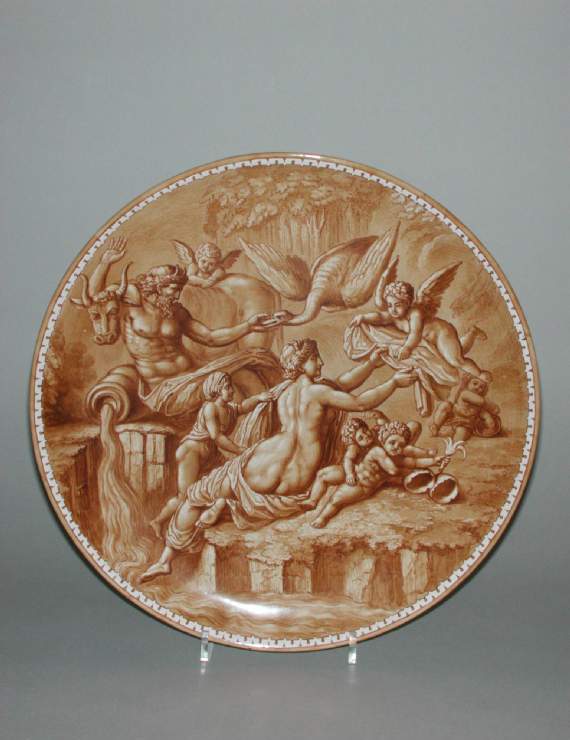Current Location: In storage
Titles
‘Apotheosis of Jupiter’ tazza
Maker(s)
Production:
Minton & Co.
Entities
Categories
Description
Pale cream earthenware, painted in shades of brown under clear glaze.
Wide, saucer-shaped dish on low spool-like foot. The design, on a buff ground which covers the upper surface, shows Jupiter holding the beak of a swan above Leda and the new-born Castor and Pollux, with other figures and a bull, against a background of trees, cliffs and flowing water. The figures are outlined in purple-brown. A thin cream toothed band runs around the rim. The raised foot is decorated with an undulating ivy leaf tendril, between two horizontal bands, all on a buff ground. The underside of the foot is glazed, with two suspension holes in the upper side.
Notes
History note: From the Charles & Lavinia Handley-Read Collection.
Legal notes
Bought with the Percival Fund and the Victoria & Albert Museum Grant in Aid fund
Measurements and weight
Diameter: 34.5 cm
Height: 6 cm
Acquisition and important dates
Method of acquisition: Bought
(1972-10-19)
by
Stainton, Thomas
Dating
Victorian
Production date:
AD 1862
: dated
Note
Kirkby is said to have painted the first piece of ‘Majolica ware’ produced by Minton. Launched at the Great Exhibition of 1851, to great acclaim, wares ‘coloured in the Majolica style’ took inspiration from Italian maiolica, tin-glazed earthenware with finely painted decoration. Some Minton designers, such as Kirkby, favoured close imitation of Italian designs (as here), though 19th-century ‘Majolica ware’ more often favours sculptural forms and brightly coloured lead glazes.
Minton, founded in 1793 by Thomas Minton (1765-1836) , originally produced blue printed earthenware and, later, creamware, bone china and other products, particularly tableware. Taking over in 1836, his son Herbert Minton revolutionised production methods and introduced new lines in encaustic and printed tiles, figures and ornamental wares. In 1858 the business passed to Herbert’s nephew, Colin Minton Campbell (1827-85), who continued the expansion. The early business traded under various names, from 1845 it was known as Minton & Co. and from 1873 as Mintons Ltd.
Thomas Kirkby (1824-1901) joined Minton as an apprentice in 1837, rising to Art Curator before his retirement in 1887. He specialised in painting classical figure subjects in the style of Italian maiolica. There is another Minton tazza of this design in the V & A Museum, inscribed 'Apotheosis of the Amours of Jupiter from Julia [sic] Romano', however recent scholarship suggests the image is in fact taken from a drawing by Pirro Ligorio (c.1513-1583) , though perhaps based on an original work by Giulio Romano (1489-1546). The V & A tazza, inscribed 'T Kirkby pinx Minton & Co’, was exhibited at the 1862 London International Exhibition. The presence of a second artist’s signature on this example suggests that Kirby used an assistant in painting this tazza, maybe to order after the exhibition.
School or Style
Renaissance Revival
People, subjects and objects depicted
Components of the work
Decoration
composed of
pigment
clear glaze
Materials used in production
Earthenware
Techniques used in production
Moulding
: Pale cream earthenware, painted in shades of brown under clear glaze.
Inscription or legends present
- Text: Kirkby
- Location: Bottom lhs of image, under Leda's left foot
- Method of creation: Painted
- Type: Inscription
Inscription present: signature, possibly ‘Ruisiola’ [?]
- Location: Bottom lhs of image, under Leda's right foot
- Type: Inscription
- Text: MINTON
- Location: Underside of base
- Method of creation: Impressed
- Type: Factory mark
Inscription present: circular crown and ermine mark
- Location: Underside of base
- Method of creation: Stamped in red
- Type: Factory mark
- Text: Apotheosis of Jupiter
- Location: Underside of base
- Method of creation: Handpainted in purple-red
- Type: Inscription
References and bibliographic entries
Identification numbers
Accession number: C.41-1972
Primary reference Number: 74966
Stable URI
Audit data
Created: Saturday 6 August 2011
Updated: Tuesday 30 April 2024
Last processed: Monday 4 August 2025
Associated departments & institutions
Owner or interested party:
The Fitzwilliam Museum
Associated department:
Applied Arts




